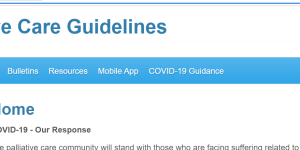Making good decisions in a very difficult time
Palliative Care
Palliative care is the discipline of managing a patient's symptoms holistically. Traditionally considered as the discipline that engages with those at the end of their life, palliative care practitioners are adept at managing symptoms in a variety of conditions and prognoses; beyond those at the end of their life.
Considering a referral to the local palliative service is important and can aid optimisation of a patient's symptoms, even in curative case.
Below are resources aimed at fostering an understanding of how to have these discussions effectively, in relation to a dying patient.
Please also see our related pages on Treatment Escalation Plans and Death Certification, which can be found in 'trainee resources'
Identifying the dying patient
Most healthcare staff will have a greater amount of time with the patient and relatives, so they may be the first to notice that a patient is entering the dying phase of their illness. Knowing how to raise this with the wider team and advocate for the patient is an important skill for all stages of training or healthcare role. This short video demonstrates how to identify a patient who may be dying, and then have that discussion amongst colleagues.
Gauging relatives understanding in a sensitive manner
The dying process is inherently uncertain with limited ability to predict what may happen or when. This can be frustrating as a clinician but can be deeply unsettling and upsetting for relatives and patients. This video demonstrates how to have an effective strategy for gauging patients and relatives understanding of their illness, prognosis and what is important to them
The importance of anticipatory care prescribing medication at the end of life
The dying process is natural but many people may experience symptoms related to this. Anticipatory medications are one method for alleviating these symptoms and ensuring a good death for all people at the end of life. The following video illustrates the importance of accurate and timely prescribing for symptom control, which can be in conjunction with active treatment termed parallel planning.
Scottish Palliative Care Guidelines


